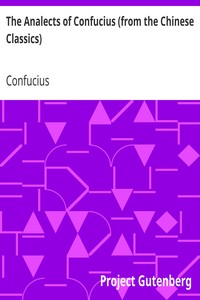The Analects of Confucius (from the Chinese Classics) by Confucius
"The Analects of Confucius" by Confucius is a philosophical work presented as a collection of sayings and ideas attributed to the Chinese philosopher Confucius and his disciples, likely composed during the early period of the Warring States (approximately 5th century BC). This foundational text of Confucianism serves as a guide on ethics, morality, and proper conduct, promoting virtues such as filial piety, righteousness, and respect for tradition. The opening of the text
sets the stage for the teachings of Confucius, emphasizing the joy of learning, the importance of friendship, and the essence of true virtue. Each chapter presents various dialogues and reflections, illustrating the value of personal integrity, the role of rituals, and the responsibilities of both rulers and citizens in ethical governance. The beginning chapters highlight key qualities of virtuous individuals and lay down principles that promote harmony in personal relationships and societal roles. As Confucius engages with his disciples, he illustrates the significance of self-cultivation and moral rectitude in both private life and public service. (This is an automatically generated summary.)
Read or download for free
| How to read | Url | Size | |||
|---|---|---|---|---|---|
| Read now! | https://www.gutenberg.org/ebooks/3330.html.images | 201 kB | |||
| EPUB3 (E-readers incl. Send-to-Kindle) | https://www.gutenberg.org/ebooks/3330.epub3.images | 147 kB | |||
| EPUB (older E-readers) | https://www.gutenberg.org/ebooks/3330.epub.images | 149 kB | |||
| EPUB (no images, older E-readers) | https://www.gutenberg.org/ebooks/3330.epub.noimages | 130 kB | |||
| Kindle | https://www.gutenberg.org/ebooks/3330.kf8.images | 308 kB | |||
| older Kindles | https://www.gutenberg.org/ebooks/3330.kindle.images | 295 kB | |||
| Plain Text UTF-8 | https://www.gutenberg.org/ebooks/3330.txt.utf-8 | 187 kB | |||
| Download HTML (zip) | https://www.gutenberg.org/cache/epub/3330/pg3330-h.zip | 148 kB | |||
| There may be more files related to this item. | |||||
Similar Books
About this eBook
| Author | Confucius, 552 BCE-480 BCE |
|---|---|
| Translator | Legge, James, 1815-1897 |
| Title | The Analects of Confucius (from the Chinese Classics) |
| Note | Reading ease score: 79.6 (7th grade). Fairly easy to read. |
| Note | Wikipedia page about this book: https://en.wikipedia.org/wiki/Analects |
| Language | English |
| LoC Class | PL: Language and Literatures: Languages and literatures of Eastern Asia, Africa, Oceania |
| Subject | Ethics -- China |
| Subject | Philosophy, Chinese |
| Category | Text |
| EBook-No. | 3330 |
| Release Date | Jul 1, 2002 |
| Most Recently Updated | Jan 8, 2021 |
| Copyright Status | Public domain in the USA. |
| Downloads | 1487 downloads in the last 30 days. |
| Project Gutenberg eBooks are always free! | |

